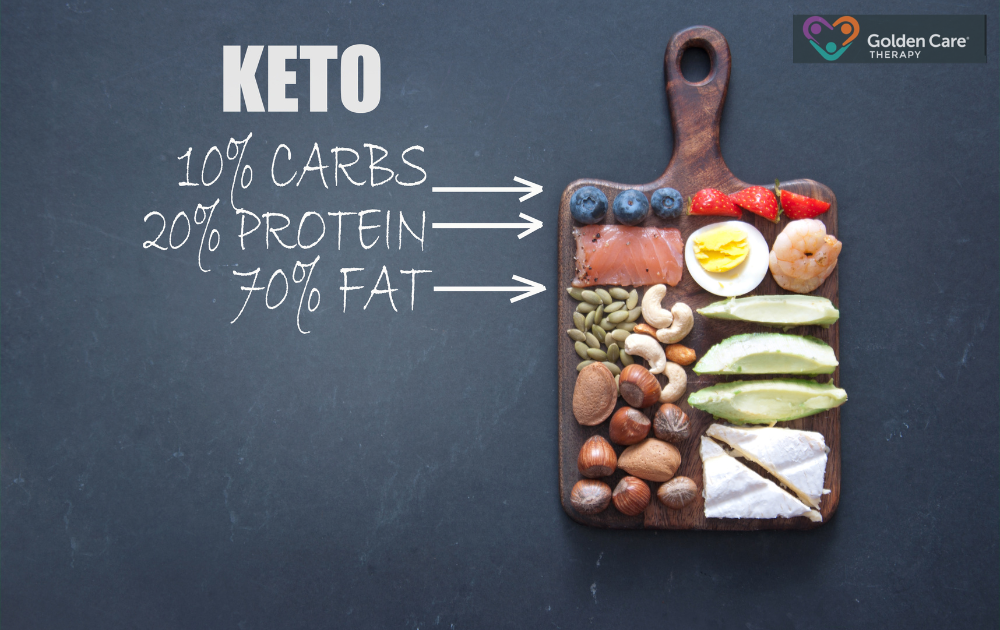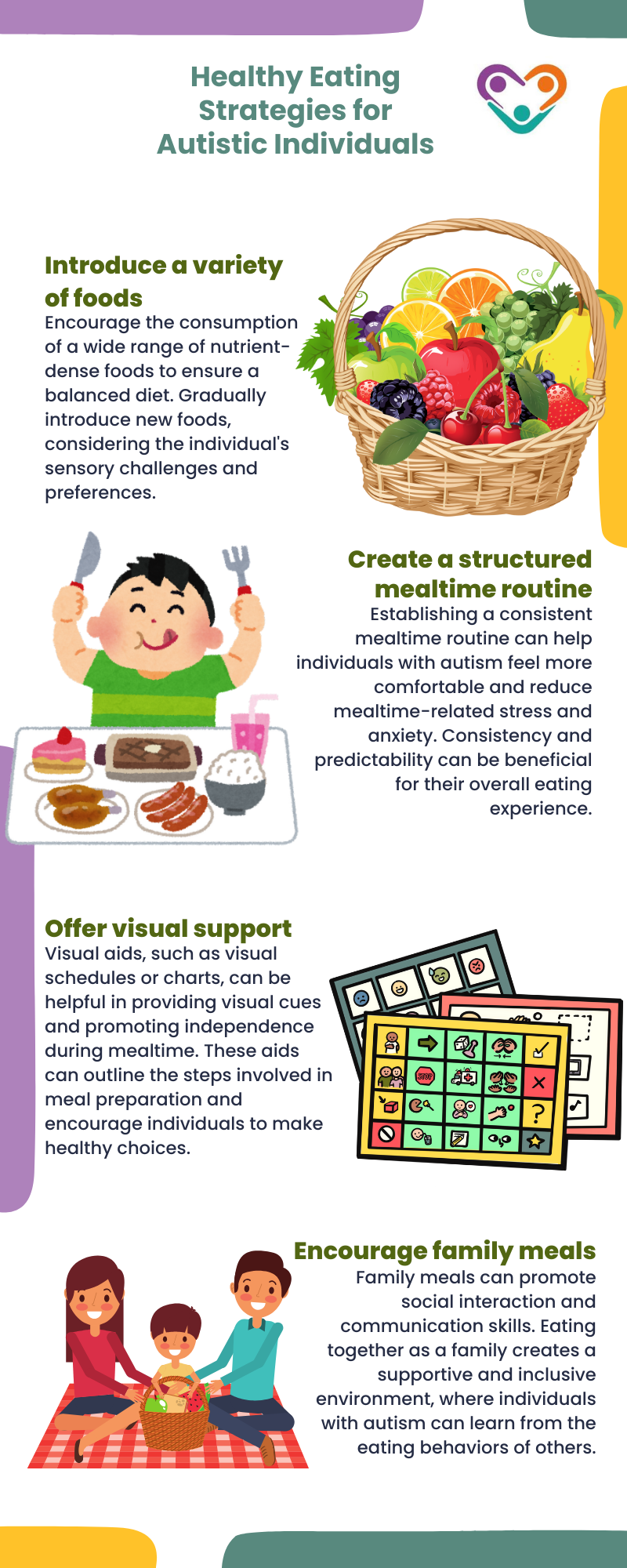Children with autism often face challenges related to food and eating. A study indicated that children with ASD exhibited more food refusal than typically developing children, with 41.7% of foods offered being rejected compared to 18.9% for typically developing children.
These challenges can stem from various factors, including sensory issues, communication difficulties, and limited food preferences.
Autistic individuals may experience sensory issues that affect their eating habits. Certain textures, smells, or tastes can be overwhelming or aversive, leading to a limited diet. This can result in nutritional deficiencies and health issues if not properly addressed.
In this article, we’ll have a look at a comprehensive guide that parents and caregivers can use when planning a diet for their autistic children.

The Impact of Nutrition on Autism
The relationship between nutrition and autism is a topic of interest for parents and caregivers of individuals with autism spectrum disorder (ASD). By understanding the impact of nutrition on autism, they can make informed dietary choices.
In this section, we will explore the connection between autism and nutrition, as well as the gastrointestinal issues commonly associated with autism.
The Connection Between Autism and Nutrition
While research suggests that there is no specific diet that can cure or cause autism, there is evidence to support the idea that nutrition can play a role in the overall well-being and management of individuals with autism.
Children with autism are reported to have significantly more feeding problems and eat a narrower range of foods compared to children without autism.
As mentioned in the previous study, such challenges can lead to various nutritional problems and health issues, such as nutrient deficiencies and inadequate weight gain.
Improving the nutritional status of individuals with autism can have a positive impact on their overall health and well-being. A balanced and nutritious diet can provide essential nutrients that support brain function, promote healthy digestion, and enhance overall energy levels.

Gastrointestinal Issues in Autism
Research suggests a strong relationship and significant correlation between eating problems and gastrointestinal (GI) dysfunction in children with autism.
Many children on the autism spectrum experience GI issues such as constipation, diarrhea, abdominal pain, and bloating. Resolving underlying GI issues can lead to improvements in focus, behavior, and emotional control.
While the exact cause of these GI issues in autism is not fully understood, it is believed that factors such as altered gut microbiota, immune system dysregulation, and food sensitivities may contribute to these problems. Addressing these issues can be an important aspect of managing the overall health of individuals with autism.
It is important to note that individual experiences and reactions to specific foods may vary among individuals with autism. Some children on the autism spectrum might have negative reactions to milk or dairy products (lactose or casein) and/or wheat products (gluten).
However, it is crucial to consult with a pediatrician or dietitian before making any significant dietary changes to ensure that the individual’s nutritional needs are met.
While there is no specific “autism diet,” nutrition plays a vital role in supporting the overall health and well-being of individuals with autism. Understanding the connection between nutrition and autism, as well as addressing any GI issues, can contribute to better outcomes and improved quality of life for individuals with autism spectrum disorder.

Dietary Options for Autistic Individuals
There are various dietary considerations that parents and caregivers should be aware of. While it’s important to approach these considerations with caution and consult with a pediatrician or dietitian, some dietary interventions have been explored in the context of autism.
Let’s look at three common dietary options that parents and caregivers can prepare for their autistic children.
Gluten and Casein-Free Diet
The gluten-free and casein-free (GFCF) diet is gaining popularity in the autism community. This diet involves excluding gluten, which is a protein found in wheat, and casein, a protein found in milk and dairy products.
It is believed that some children on the autism spectrum might have negative reactions to these proteins.
While some parents have reported improvements in autism behaviors in their children who followed a GFCF diet, it’s important to note that there is limited scientific evidence to support its efficacy.
Additionally, following a GFCF diet can pose challenges in terms of obtaining proper nutrition, as it may result in a deficiency of certain nutrients.
If considering a GFCF diet for a child with autism, it is strongly advised to consult with a dietitian to ensure that the child’s nutritional needs are being met. They can provide guidance on alternative sources of nutrients typically found in gluten and casein-containing foods.

Ketogenic Diet
Another dietary intervention that has been explored in the context of autism is the ketogenic diet. The ketogenic diet is a high-fat, low-carbohydrate diet that has been used primarily for the treatment of epilepsy. It involves significantly reducing carbohydrate intake and increasing the consumption of healthy fats.
While research on the ketogenic diet specifically for autism is limited, some parents have reported improvements in certain autism symptoms such as hyperactivity and repetitive behaviors.
However, it’s important to note that this diet is highly restrictive and should only be pursued under the guidance of a healthcare professional.
Other Dietary Interventions
In addition to the gluten and casein-free diet and the ketogenic diet, there are other dietary interventions that parents and caregivers may consider for individuals with autism.
These interventions can vary and may involve eliminating certain highly allergic foods or additives from the diet.
One approach that parents can try is an elimination diet, where certain foods such as gluten, casein, or other highly allergic foods are omitted for a period of time, usually about a month. During this period, it is important to observe any improvements in symptoms.
Reintroducing one new food at a time every few days during the reintroduction phase can help determine which foods are tolerated and which may be causing adverse reactions.
It is crucial to seek guidance from a healthcare professional, such as a pediatrician or dietitian, before implementing any dietary interventions. They can provide personalized advice based on the individual’s specific needs and help ensure that proper nutrition is maintained while exploring dietary considerations for autism.

Practical Approaches to Autism and Diet
Fortunately, there are practical approaches that parents and caregivers can implement to support the nutritional needs of individuals on the autism spectrum. These approaches focus on promoting healthy eating strategies, addressing sensory challenges, and considering nutritional supplements.
Let’s look at them in further detail.
Healthy Eating Strategies
Implementing healthy eating strategies can play a crucial role in supporting the overall well-being of individuals with autism. Here are some key strategies to consider:

Addressing Sensory Challenges
Many individuals with autism experience sensory challenges that can impact their eating habits. Addressing these challenges can help create a more positive and comfortable eating experience.
Here are some strategies to consider:
- Texture modifications – Some individuals with autism may have aversions to certain food textures. Modifying the texture of food by blending, pureeing, or offering alternatives can help accommodate these sensory preferences.
- Gradual exposure to new foods – Introduce new foods gradually, allowing individuals to get accustomed to different tastes, smells, and textures. Start with small portions and offer positive reinforcement to encourage them to explore new foods.
- Sensory-friendly environment – Create a sensory-friendly eating environment by minimizing distractions, reducing noise levels, and providing a comfortable seating arrangement. This can help individuals focus on their meals and reduce sensory overload.
Nutritional Supplements for Autism
In some cases, nutritional supplements may be considered to address specific nutrient deficiencies or support overall well-being. However, it is important to consult with a healthcare professional or a registered dietitian before introducing any supplements.
They can provide guidance on appropriate dosages and help determine if supplements are necessary based on individual needs.
Some supplements that are commonly considered for individuals with autism include:
- Omega-3 fatty acids – Omega-3 supplements, such as fish oil, may support brain health and cognitive function. However, more research is needed to fully understand the potential benefits for individuals with autism.
- Probiotics – Probiotics are beneficial bacteria that can promote a healthy gut microbiome. Some studies suggest that individuals with autism may have imbalances in their gut microbiota, and probiotic supplementation may help improve gastrointestinal symptoms.
- Vitamin and mineral supplements – Individuals with autism may have specific nutrient deficiencies. A healthcare professional can conduct tests to identify any deficiencies and recommend appropriate vitamin and mineral supplements if needed.
It is important to note that while nutritional approaches can play a role in managing certain behaviors associated with autism, they do not cure autism itself.
It is essential to work closely with healthcare professionals to develop a comprehensive and individualized approach that addresses the unique needs of individuals on the autism spectrum.
Research continues to shed light on the neurological basis of sensory issues in autism, offering hope for more targeted and effective therapies in the future. By recognizing and addressing sensory processing difficulties, we can improve the quality of life for individuals with autism and their families. If you’re seeking specialized ABA therapy in New Jersey, Indiana, Georgia, and New York, Golden Care offers comprehensive services tailored to meet the unique needs of each individual. Contact us to learn more or book a consultation today.
Sources:
https://www.webmd.com/diet/features/diet-and-autism
https://www.bda.uk.com/resource/autism-diet.html
https://www.verywellhealth.com/connections-between-autism-and-nutrition-4155118
https://www.autismparentingmagazine.com/autism-diet-and-nutrition/



